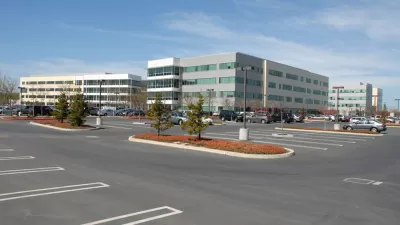The city of Mountain View chose to allot most of the redevelopment rights in its much sought-after North Bayshore area not to the city's largest employer and taxpayer but to LinkedIn's more conventional proposal.
"In a blow to Google’s expansion plans, the Mountain View City Council voted to give the search giant roughly a quarter of the office space it had requested for the project, and instead awarded the lion’s share of the city’s future office development –- 1.5 million square feet –- to LinkedIn, writes Conor Dougherty of The New York Times Bits blog which "reports on the technology industry, including start-ups, the Internet, enterprise and gadgets."
The vote was part of a years-long plan for how to redevelop Mountain View’s North Bayshore area, a mass of low-slung office parks that surrounds Google’s headquarters and is separated from Mountain View proper by Highway 101.
Perhaps the rejection should not have been all that surprising. In March, Planetizen editor James Brasuell posted that Google's proposal "is likely to aggravate an increasingly testy relationship between the company and community leaders who fear the company is overrunning their small city," also based on a piece by Dougherty.
For LinkedIn, it was a David vs. Goliath victory that was the result of several savvy moves and a project that was ambitious but not too ambitious. [In addition,] one of LinkedIn’s selling points was that it would “preserve business diversity,” meaning it would reduce Mountain View’s dependence on Google.
Compared to Google’s clear, space-age headquarters [known as the Googleplex], LinkedIn’s proposal, called the Shoreline Commons, was quite modest. It would be a cluster of offices and retail, including a movie theater and a gym with a pool and a basketball court, along with several bike and pedestrian paths. But modesty was part of the pitch.
"The overriding principal [sic] is we took the precise plan, and the city wanted this kind of project at the gateway: Entertainment, mixed use. What we tried to do is deliver that," said Jim Morgensen, LinkedIn's real estate chief, in an earlier chat with the Silicon Valley Business Journal.
LinkedIn's representative told the Mountain View City Council, "We are doing this without asking for any variances in heights or density, with a project that can be built now with existing technology and union labor,” writes Dougherty. "It was a not-so-veiled reference to Google’s plan, which required height exceptions and engineering technologies that have not yet been developed."
Housing Included
LinkedIn also made the savvy move of partnering with an affordable housing developer, which aims to build new housing projects nearby. Google also had plans to develop housing and is still likely play a role in whatever housing plan emerges, as it owns most of the land in North Bayshore.
Has Google outgrown Mountain View to house its headquarters? See Jason Henry's eight-photo slide show of the suburban city for The New York Times.
San Francisco-based Heather Smith pens several excellent pieces about Google's Mountain View campus, its expansion proposal, and the basic nature of suburban office parks for Grist.
FULL STORY: Google Loses to LinkedIn in Silicon Valley Headquarters Pitch

Planetizen Federal Action Tracker
A weekly monitor of how Trump’s orders and actions are impacting planners and planning in America.

Restaurant Patios Were a Pandemic Win — Why Were They so Hard to Keep?
Social distancing requirements and changes in travel patterns prompted cities to pilot new uses for street and sidewalk space. Then it got complicated.

Map: Where Senate Republicans Want to Sell Your Public Lands
For public land advocates, the Senate Republicans’ proposal to sell millions of acres of public land in the West is “the biggest fight of their careers.”

Maui's Vacation Rental Debate Turns Ugly
Verbal attacks, misinformation campaigns and fistfights plague a high-stakes debate to convert thousands of vacation rentals into long-term housing.

San Francisco Suspends Traffic Calming Amidst Record Deaths
Citing “a challenging fiscal landscape,” the city will cease the program on the heels of 42 traffic deaths, including 24 pedestrians.

California Homeless Arrests, Citations Spike After Ruling
An investigation reveals that anti-homeless actions increased up to 500% after Grants Pass v. Johnson — even in cities claiming no policy change.
Urban Design for Planners 1: Software Tools
This six-course series explores essential urban design concepts using open source software and equips planners with the tools they need to participate fully in the urban design process.
Planning for Universal Design
Learn the tools for implementing Universal Design in planning regulations.
Heyer Gruel & Associates PA
JM Goldson LLC
Custer County Colorado
City of Camden Redevelopment Agency
City of Astoria
Transportation Research & Education Center (TREC) at Portland State University
Camden Redevelopment Agency
City of Claremont
Municipality of Princeton (NJ)




























